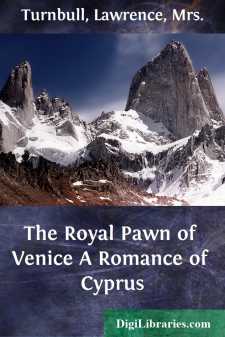Categories
- Antiques & Collectibles 13
- Architecture 36
- Art 48
- Bibles 22
- Biography & Autobiography 813
- Body, Mind & Spirit 142
- Business & Economics 28
- Children's Books 15
- Children's Fiction 12
- Computers 4
- Cooking 94
- Crafts & Hobbies 4
- Drama 346
- Education 46
- Family & Relationships 57
- Fiction 11828
- Games 19
- Gardening 17
- Health & Fitness 34
- History 1377
- House & Home 1
- Humor 147
- Juvenile Fiction 1873
- Juvenile Nonfiction 202
- Language Arts & Disciplines 88
- Law 16
- Literary Collections 686
- Literary Criticism 179
- Mathematics 13
- Medical 41
- Music 40
- Nature 179
- Non-Classifiable 1768
- Performing Arts 7
- Periodicals 1453
- Philosophy 64
- Photography 2
- Poetry 896
- Political Science 203
- Psychology 42
- Reference 154
- Religion 513
- Science 126
- Self-Help 84
- Social Science 81
- Sports & Recreation 34
- Study Aids 3
- Technology & Engineering 59
- Transportation 23
- Travel 463
- True Crime 29
The Royal Pawn of Venice A Romance of Cyprus
Description:
Excerpt
Among the day-dreams of the Rulers of Venice the island of Cyprus had long loomed large and fair—Cyprus, the happy isle of romance, l'isola fortunata, sea-girdled, clothed with dense forests of precious woods, veined with inexhaustible mines of rich metals; a very garden of luscious fruits, garlanded with ever-blooming flowers—a land flowing with milk and honey and steeped in the fragrance of wines that a god might covet.
Kypros—Paphos—a theme for poets, where Aphrodite rose from the foam of the sea, and the fabled groves of the mysteries of Venus gave place to primitive shrines of Christian worship, while innumerable Grecian legends were merged in early Christian traditions, imparting some of their own tint of fable, yet baptizing anew the groves and hillsides to sanctity. Beautiful hillsides, rippling down to the sea-coasts; and plains, nestling among the mountain slopes, littered with remnants of vast temples of superb pagan workmanship and with priceless pre-historic remains: wonderful, ancient marbles, time-mellowed and crumbling, inwrought rather with barbaric symbols of splendor than with the tender grace of poetic suggestion.
And this land of many races and dynasties, of conflicting ideals and religions, as of many tongues—where domination was largely a matter of the stronger hand—still held among the nations her ancient soubriquet of the happy isle.
But less for her romance and beauty than because this notissima famæ insulæ was a possession to be envied by a diplomatic nation, since its position lent it importance, the Republic had looked upon it with longing eyes—and because of its commerce, which equalled that of Venice, long ago the far-seeing Senate had sought to purchase it from the Greek Emperor, but the agreement had come to naught by treachery of the Emperor's son.
Nevertheless, Cyprus had not been forgotten; and the time for Venice to make good this remembrance had now come uppermost on the calendar of the years.
So they were ready to give rapt attention to the flattering proposals of the young Cyprian Monarch, as presented by his dignified ambassador, the Signor Filippo Mastachelli, when he appeared before the Signoria with the retinue and splendor of an Eastern Prince, bearing gifts of jewels meet for a royal bride, to claim the hand of a patrician maid of Venice, to make her Queen of Cyprus.
Janus the Second was young and brave, the idol of a party of his people—and where was the kingdom in which there were known to be no discontents? He was upheld by the great Sultan of Egypt to whom he owed suzerainty and, if in disfavor of the Holy Father for this allegiance, Venice had always permitted Rome to question her own supremacy and was not disconcerted thereby. He was beautiful as a young god, with a face full of laughing appeal, and not less charming than the miniature set in crystals which Mastachelli bore among the wedding gifts; and the grace of him could not be matched, for his power of winning, when he had set his heart to the task. In whatever deed of skill and daring his prowess went before his knights and nobles—as, from childhood up, in whatever teaching from books or men, he had distanced all his comrades—with that strange facility and fascination with which the Genius of Cyprus might have endowed her favorite in that lavish land, beloved of the gods, where her great sea-bound plains were billows of flowers under a long summer sky, and Nature's gifts came crowding, each upon each, in bewildering redundancy....


